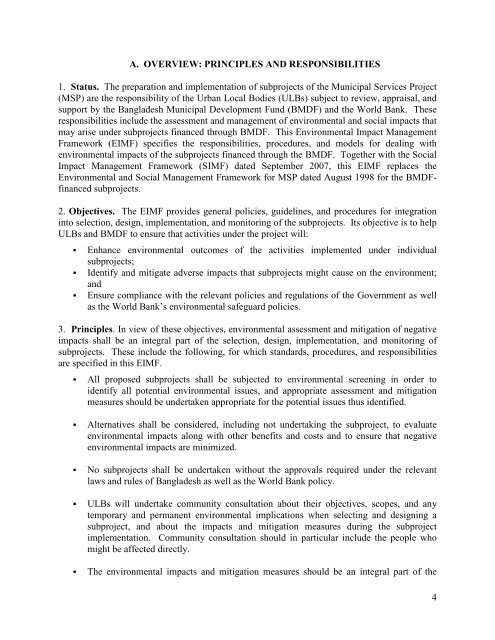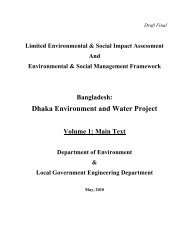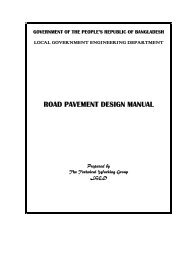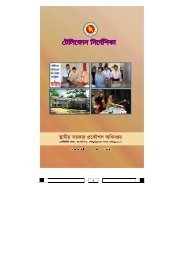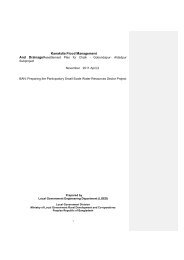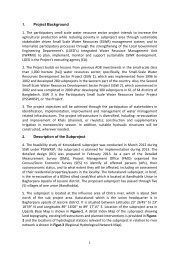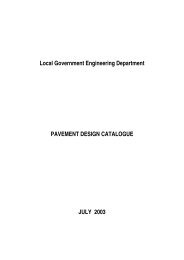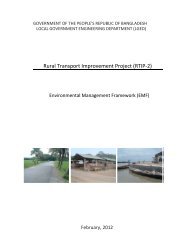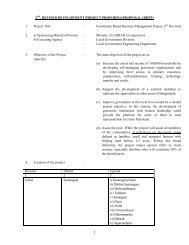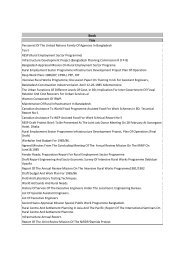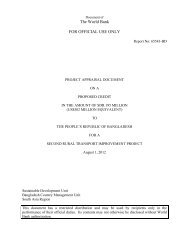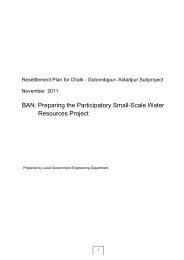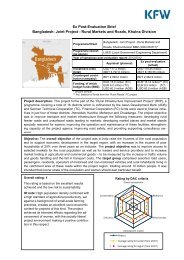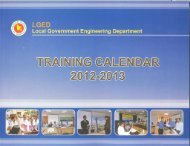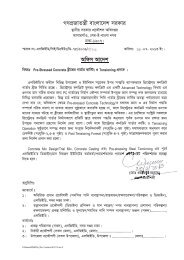environmental impact management framework (eimf) - LGED
environmental impact management framework (eimf) - LGED
environmental impact management framework (eimf) - LGED
You also want an ePaper? Increase the reach of your titles
YUMPU automatically turns print PDFs into web optimized ePapers that Google loves.
A. OVERVIEW: PRINCIPLES AND RESPONSIBILITIES<br />
1. Status. The preparation and implementation of subprojects of the Municipal Services Project<br />
(MSP) are the responsibility of the Urban Local Bodies (ULBs) subject to review, appraisal, and<br />
support by the Bangladesh Municipal Development Fund (BMDF) and the World Bank. These<br />
responsibilities include the assessment and <strong>management</strong> of <strong>environmental</strong> and social <strong>impact</strong>s that<br />
may arise under subprojects financed through BMDF. This Environmental Impact Management<br />
Framework (EIMF) specifies the responsibilities, procedures, and models for dealing with<br />
<strong>environmental</strong> <strong>impact</strong>s of the subprojects financed through the BMDF. Together with the Social<br />
Impact Management Framework (SIMF) dated September 2007, this EIMF replaces the<br />
Environmental and Social Management Framework for MSP dated August 1998 for the BMDFfinanced<br />
subprojects.<br />
2. Objectives. The EIMF provides general policies, guidelines, and procedures for integration<br />
into selection, design, implementation, and monitoring of the subprojects. Its objective is to help<br />
ULBs and BMDF to ensure that activities under the project will:<br />
• Enhance <strong>environmental</strong> outcomes of the activities implemented under individual<br />
subprojects;<br />
• Identify and mitigate adverse <strong>impact</strong>s that subprojects might cause on the environment;<br />
and<br />
• Ensure compliance with the relevant policies and regulations of the Government as well<br />
as the World Bank’s <strong>environmental</strong> safeguard policies.<br />
3. Principles. In view of these objectives, <strong>environmental</strong> assessment and mitigation of negative<br />
<strong>impact</strong>s shall be an integral part of the selection, design, implementation, and monitoring of<br />
subprojects. These include the following, for which standards, procedures, and responsibilities<br />
are specified in this EIMF.<br />
• All proposed subprojects shall be subjected to <strong>environmental</strong> screening in order to<br />
identify all potential <strong>environmental</strong> issues, and appropriate assessment and mitigation<br />
measures should be undertaken appropriate for the potential issues thus identified.<br />
• Alternatives shall be considered, including not undertaking the subproject, to evaluate<br />
<strong>environmental</strong> <strong>impact</strong>s along with other benefits and costs and to ensure that negative<br />
<strong>environmental</strong> <strong>impact</strong>s are minimized.<br />
• No subprojects shall be undertaken without the approvals required under the relevant<br />
laws and rules of Bangladesh as well as the World Bank policy.<br />
• ULBs will undertake community consultation about their objectives, scopes, and any<br />
temporary and permanent <strong>environmental</strong> implications when selecting and designing a<br />
subproject, and about the <strong>impact</strong>s and mitigation measures during the subproject<br />
implementation. Community consultation should in particular include the people who<br />
might be affected directly.<br />
• The <strong>environmental</strong> <strong>impact</strong>s and mitigation measures should be an integral part of the<br />
4


